40 conduction system of the heart diagram
Diagram 2(a) is a simplification of Diagram (1). Diagram 2(b) includes additional information about structures concerned with the system of electrical conduction operating in the heart, which is described on the page about.More about the and the vascular system generally are included on other pages in this section. the more muscular ventricles pump the blood out of the heart.The heart, although a single organ, can be considered as two pumps that propel blood through two different circuits. The right atrium receives venous blood from the , chest, and arms via the largecalled the superior and receives blood from the , pelvic region, and...
CONDUCTION SYSTEM ANATOMY The functions of the electrical system of the heart (Fig. II-1) are not only initiation and rate of the heartbeat, but its coordinated transmission to the entire heart resulting in maximum mechanical efficiency. Anatomy of the conduction system Sinus Node AV Node right ventricle left ventricle left atrium right atrium

Conduction system of the heart diagram
Diagram of the cardiac conduction system What are the parts of the cardiac conduction system? Your cardiac conduction system contains specialized cells and nodes that control your heartbeat. These are the: Sinoatrial node. Atrioventricular node. Bundle of His (atrioventricular bundle). Purkinje fibers. Sinoatrial node Thus, the cardiovascular system uses bulk flow (convection) to reduce the effective distance between the pumping action of the heart and the various parts of an organism. In order for this system to be practical and do its job efficiently, two important conditions must be satisfied: (1) there must be adequate blood flow through... DESIGN OF THE CARDIOVASCULAR SYSTEM HEMODYNAMICS STRUCTURE AND FUNCTION OF THE MICROCIRCULATION... The cardiac conduction system involves the spread of electrical activity from the sinoatrial node, to the atrioventricular node, down the bundle of His and along the Purkinje fibres. As the electrical activity spreads along the heart's conduction system it initiates myocardial contraction in the surrounding myocardial tissue.
Conduction system of the heart diagram. Executive Summary 686 Overview 688 Methodology in the Establishment of Reference Value and Ranges 688 Acoustic Windows and Echocardiographic Views ofthe Right Heart 690 Nomenclature of Right Heart Segments and Coronary Supply 690 Conventional Two-Dimensional Assessment of the Right Heart 690 A. Right Atrium 690 RA Pressure 691 ig ... The conduction system of the heart. 2. • The heart is endowed with a special system for (1) generating rhythmical electrical impulses to cause rhythmical contraction of the heart muscle (2) conducting these impulses rapidly through the heart. • When this system functions normally, the atria contract about one sixth of a second ahead of ... Start studying Conduction System of the heart (Full reading). Learn vocabulary, terms, and more with flashcards, games, and other study tools. In the developed heart, these functions are performed by the cardiac conduction system (CCS), which is made up of various components that each carry out a particular task ( ). For example, specialized pacemaker myocytes in the sinoatrial node (SAN), which is located at the junction of the right atrium and the superior caval...
Cardiac conduction system. The heartbeat starts in the heart itself due to the sino-atrial node (SAN).. The SAN is found in the top of the right atrium and sets the rate at which the heart ... A cardiac conduction system is a group of specialized cardiac muscle cells in the walls of the heart that send signals to the heart muscle causing it to contract. The main components of the cardiac conduction system are the SA node, AV node, the bundle of His, bundle branches, and Purkinje fibers. The cardiac conduction system is a collection of nodes and specialised conduction cells that initiate and co-ordinate contraction of the heart muscle. It consists of: Sinoatrial node Atrioventricular node Atrioventricular bundle (bundle of His) Purkinje fibres long strands of barrel shaped cells with few myofibrils complete the pathway through the interventricular septum , penetrate into the heart apex and then turn superiorly into the ventricular walls. the bundle branches excite the septal cells, but the bulk of ventricular depolarization depends on the large purkinje fibers and ultimately on cell to cell transmission of the impulse via gap junctions between the ventricular muscle cells. because the left ventricle is much larger than the right ...
In the diastole phase, heart ventricles relax and the heart fills with blood. In the systole phase, the ventricles contract and pump blood out of the heart to arteries. One cardiac cycle is completed when the heart chambers fill with blood and blood is pumped out of the heart. This video shows the steps to draw diagram of Conduction System of Human Heart of Class 12.This diagram is one of the easiest diagrams of Heart. It can be dr... Show full transcript for The Cardiac Conduction System video Hide Transcript So now we're going to discuss the cardiac conduction system and its components. This is a deeper dive into the biomechanical and electromechanical actions of this incredible organ called the heart. The conduction system provides for a _____ path of spread of action potentials through the heart preferred The conduction system provides for a preferred path of spread of action potentials through the heart.
The Heart Structures of the Heart. Conduction System Functions of the Heart. The Blood Vessels and Circulation Blood Vessels. Blood Pressure Blood Circulation. Summary Critical Thinking. Websites Review Questions. OBJECTIVES. After reading this chapter, readers should be able to: 1. Describe the organization of the cardiovascular . system and ...
Electrical Conduction System of the Heart Create healthcare diagrams like this example called Electrical Conduction System of the Heart in minutes with SmartDraw. SmartDraw includes 1000s of professional healthcare and anatomy chart templates that you can modify and make your own.
The heart pumps blood through the network of arteries and veins called the cardiovascular system. The heart has four chambers: The right atrium receives blood from... Starved of oxygen, part of the heart muscle dies.(dysrhythmia): An abnormal heart rhythm due to changes in the conduction of electrical impulses through the...
The heart's electrical system. In the simplest terms, the heart is a pump made up of muscle tissue. Like all muscle, the heart needs a source of energy and oxygen to function. The heart's pumping action is regulated by an electrical conduction system that coordinates the contraction of the various chambers of the heart. How does the heart beat?
By characterizing the genetic underpinnings of the vertebrate cardiac conduction system, a new study sheds light on the mechanisms underlying cardiac arrhythmias, which cause the sudden death of hu...
Download 129 Conduction System Heart Stock Illustrations, Vectors & Clipart for FREE or amazingly low rates! New users enjoy 60% OFF. 178,228,477 stock photos online.
Blood enters the right atrium of the heart through the superior vena cava. The right atrium contracts and pushes the blood cells through the tricuspid valve into the right ventricle. The right ventricle then contracts and pushes the blood through the pulmonary valve into the pulmonary artery, which takes it to the lungs. In the...
The adult conduction system is shown below. Diagram of the adult cardiac conduction system. Development of the conduction system. Cardiomyocytes in the caudal heart tube are the first to become electrically active and become the "pacemaker". The SA node, which develops during the fifth week, initially develops in the sinus venosus and then ...

On holiday in Florence (Firenze), Tuscany, Italy, where there was a lot of street art and graffiti, however most of it was extremely good, including this simple one that, to me, tells a powerful and strong story.
The heart and circulatory system make up your cardiovascular system. Your heart works as a pump that pushes blood to the organs, tissues, and cells of your body. Blood delivers oxygen and nutrients...
The heart and circulatory system make up your cardiovascular system. Your heart works as a pump that pushes to the organs, tissues, and cells of your body. Blood delivers oxygen and nutrients to every cell and removes the carbon dioxide and waste products made by those cells. Blood is carried from your heart to the rest of your...
• To recognize that the intrinsic conduction system coordinates heart activity by determining the direction and speed of heart depolarization. • To relate heart electrical activity to an ECG wave tracing. Page 3. Intrinsic Conduction System • This diagram shows the location of the autorhythmic, or nodal cells of the intrinsic conduction
The conduction system of the heart. Normal excitation originates in the sinoatrial (SA) node, then propagates through both atria (internodal tracts shown as dashed lines). The atrial depolarization spreads to the atrioventricular (AV) node, passes through the bundle of His (not labeled), and then to the Purkinje fibers which make up the left ...
Download scientific diagram | Conduction system of the heart from publication: THE ISSUE OF AGGRESSION IN PATIENTS WITH VENTRICULAR TACHYCARDIA WITH PULSE AND A SHORT EPISODE OF CARDIAC ARREST ...
In complete heart block, there will be delayed conduction or no conduction of impulse to ventricular muscle fibers from the SA node. Heart blocks are: 1. First degree block wherein there will be delayed conduction of impulse from the SA node. 2. Second degree block in which some impulses from SA node only get conducted to the ventricles. 3.
Explain the conduction system of the heart (4 marks) (one mark for the following) The heart is myogenic, it generates its own electrical impulses. The sinoatrial node, the heart's pacemaker, initiates the heartbeat through sending an electrical impulse. The impulse causes a wave of excitation spreading through the atria. This causes atrial ...
• To recognize that the intrinsic conduction system coordinates heart activity by determining the direction and speed of heart depolarization. • To relate heart electrical activity to an ECG wave tracing. Page 3. Intrinsic Conduction System • This diagram shows the location of the autorhythmic, or nodal cells of the intrinsic conduction ...
Along with the circulatory system, the heart works to supply blood and oxygen to all parts of the body. The heart is located in the chest cavity just posterior to the breastbone, between the lungs, and superior to the diaphragm. It is surrounded by a fluid-filled sac called the pericardium, which serves to protect this vital...
Electrical conduction system of the heart quiz for students! In nursing school, especially in your pathophysiology or anatomy class, you will have to know how the Sinoatrial node (SA node), Atrioventricle node (AV node), Bundle of His, right and left bundle branches, and Purkinje fibers work to make the heart contract.
The interatrial conduction pathway, also called Bachmann's bundle, refers to a preferential pathway of specialized cardiomyocytes that facilitate the conduction of impulses between the atria. The pathway branches from the anterior internodal pathway at the level of the superior vena cava.
Oct 05, 2020 · Easily learn the conduction system of the heart using this step-by-step labeled diagram. The cardiac conduction system is the electrical pathway of the heart that includes, in order, the SA node, AV node, bundle of His, bundle branches, and Purkinje fibers. Learn about pacemaker cells and cardiac ac
The conduction system consists of specialised heart muscle cells, and is situated within the myocardium. There is a skeleton of fibrous tissue that surrounds the conduction system which can be seen on an ECG. Dysfunction of the conduction system can cause irregular, fast, or slow heart rhythms . Contents 1 Structure 1.1 Development 2 Function
Thankfully we don't need to plug ourselves in to the mains, the heart is able to create it's own electrical impulses and control the route the impulses take via a specialised conduction pathway. This pathway is made up of 5 elements: The sino-atrial (SA) node The atrio-ventricular (AV) node The bundle of His The left and right bundle branches
it is essential for understanding the function of the heart. Histologically, the heart is made of three layers of: epicardium, myocardium, and endocardium.Clinical relations: Endocarditis The epicardium is the outermost layer of the heart. It is actually the visceral layer of the serous , which adheres to the myocardium of the...
Aug 23, 2007 · The heart is an amazing muscle. For reasons described on this previous blog, “The Anatomy And Heart Function“, I am constantly marveling at all the complex elements that makes the heart operate. Interestingly enough… Electricity has a lot to do with the actual starts and stops (aka contractions) in the cardiac conduction system.
Cardiac Conduction System Disorders . Disorders of the heart's conduction system can cause problems with the heart's ability to function effectively. These problems are typically the result of a blockage that diminishes the rate of speed at which impulses are conducted.
The Task Force for the diagnosis and management of syncope of the European Society of Cardiology (ESC) Developed with the special contribution of the European... 4 Cardiac arrhythmias as the primary cause 1921 5.4.1 Syncope due to intrinsic sinoatrial or atrioventricular conduction system disease 1921 5.4.1.1 Sinus node disease...
The chambers of the mature human heart have a complex inner surface, the function of which is unknown. Unlike the smooth endothelium of the great vessels, the... Trabeculae are also important for the formation of the conduction system . Theoretical analyses have proposed that their complex structure may contribute to efficient...
The cardiac conduction system involves the spread of electrical activity from the sinoatrial node, to the atrioventricular node, down the bundle of His and along the Purkinje fibres. As the electrical activity spreads along the heart's conduction system it initiates myocardial contraction in the surrounding myocardial tissue.
Thus, the cardiovascular system uses bulk flow (convection) to reduce the effective distance between the pumping action of the heart and the various parts of an organism. In order for this system to be practical and do its job efficiently, two important conditions must be satisfied: (1) there must be adequate blood flow through... DESIGN OF THE CARDIOVASCULAR SYSTEM HEMODYNAMICS STRUCTURE AND FUNCTION OF THE MICROCIRCULATION...
Diagram of the cardiac conduction system What are the parts of the cardiac conduction system? Your cardiac conduction system contains specialized cells and nodes that control your heartbeat. These are the: Sinoatrial node. Atrioventricular node. Bundle of His (atrioventricular bundle). Purkinje fibers. Sinoatrial node




![Electrical Conduction System of the Heart [8] | Download ...](https://www.researchgate.net/profile/Ledisi_Kabari5/publication/332174026/figure/fig3/AS:739672661688322@1553363113190/Electrical-Conduction-System-of-the-Heart-8.jpg)
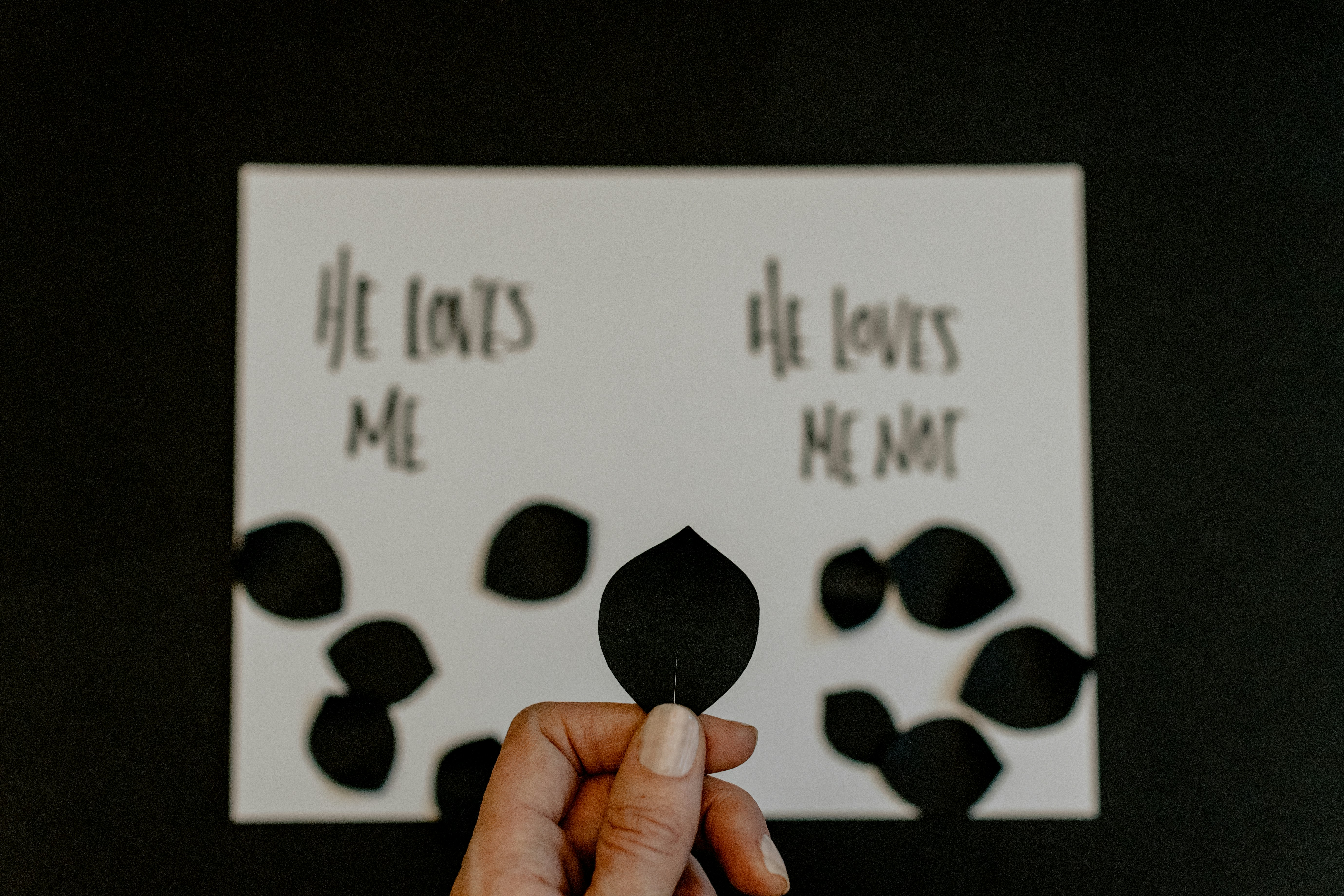



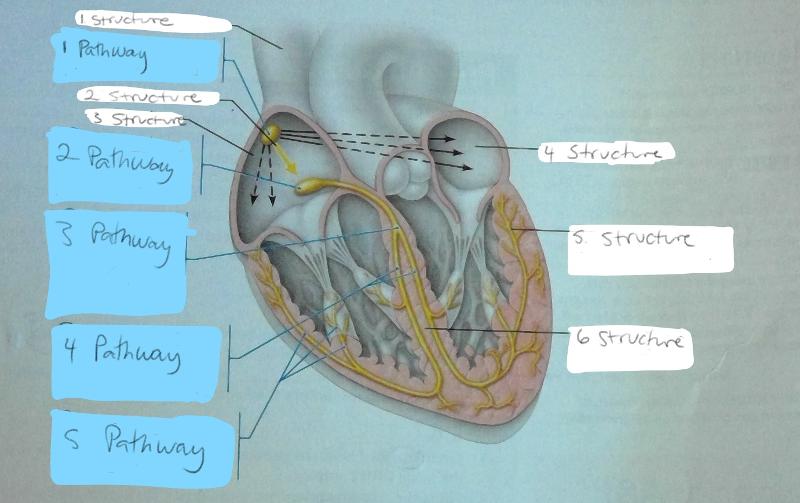













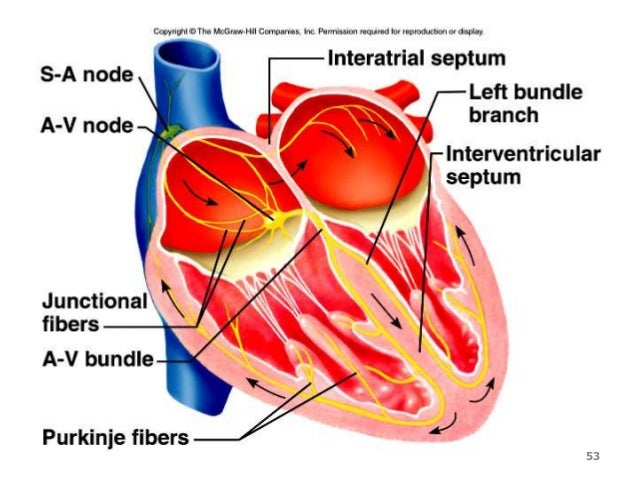


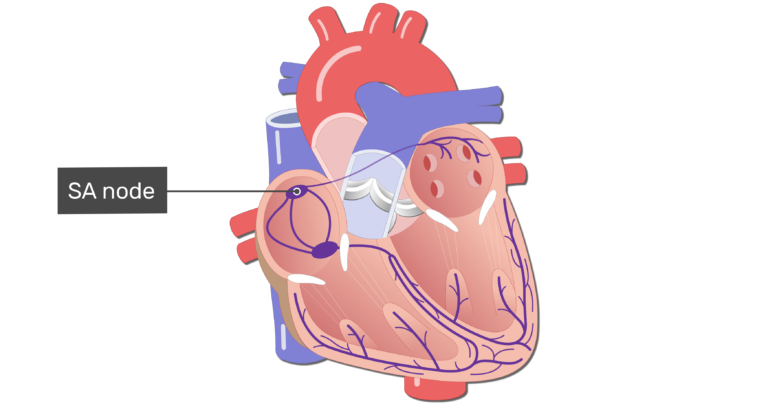

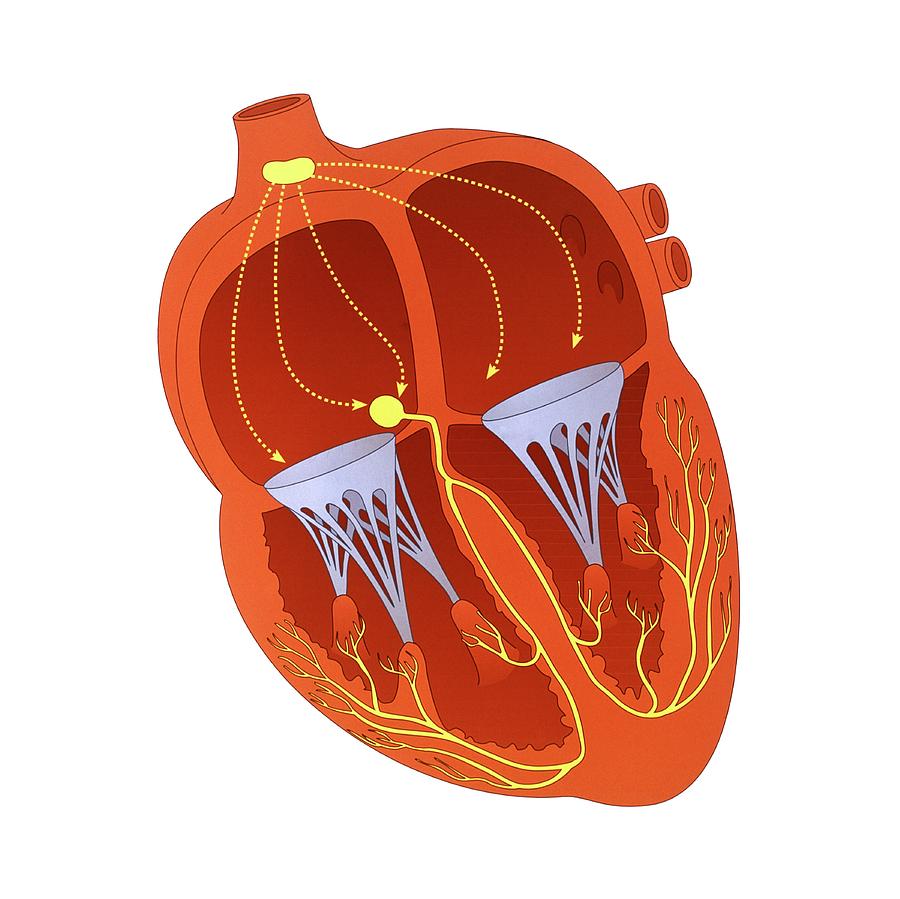
0 Response to "40 conduction system of the heart diagram"
Post a Comment